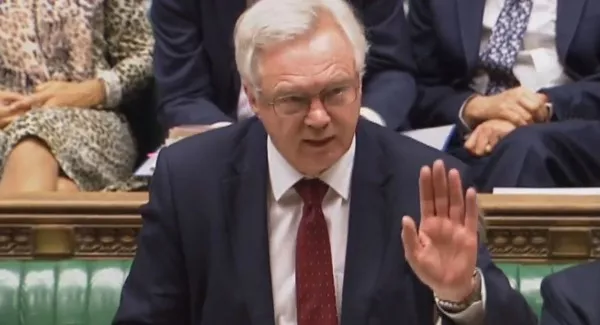By Eamon Quinn
Sterling fell as the political turmoil surrounding Brexit ratcheted higher for UK prime minister Theresa May, but the Ftse-100 index was bolstered by hopes the UK was heading for a soft Brexit deal.
The resignations of Brexit heavyweights David Davis and Boris Johnson from the British cabinet increased the chances of an outright challenge to May’s leadership and an early general election, analysts said.
That helped push sterling lower because investors dislike the political uncertainty that the resignations entail.
Nonetheless, UK shares ended higher, as the Ftse-100 which is heavy with international firms that benefit when sterling falls. The index rose by almost 1%.
However, the broader Ftse-250 index and its smaller-cap British shares also rose amid investor hopes the UK was turning away from leaving the EU next year with a no-Brexit deal.
“Boris Johnson’s resignation has put pressure on sterling, on the basis that others will follow and imperil the government, but it has at least meant that UK stocks have been in high demand,” said Chris Beauchamp, chief market analyst at IG, an online broker.
"The Ftse 100’s 60-point gain has been outshone by the near 1% rise for the Ftse-250, in no small part due to the hopes of a very soft, if not the softest-possible, Brexit now looks likely, if we get one at all, that is."
In Dublin, a Brexit conference at the Institute of International and European Affairs heard the Government should encourage non-UK retailers to set up in Ireland should the UK fail to remain in the customs union.
Sterling reversed gains after Johnson, who was the face of the campaign to exit the EU, followed Brexit Secretary David Davis in stepping down over disagreements about May’s Brexit strategy.
A move by Tory MPs to try to oust the prime minister could lead the currency to fall to $1.25, strategists say.
“The resignation of Johnson will add to market fears of a leadership challenge, in the process risking further UK political paralysis,” said Jeremy Stretch, head of Group-of-10 currency strategy at Canadian Imperial Bank of Commerce.
“Events of the last 24 hours suggest that more extreme Brexit conclusions are on the rise, suggesting sterling volatility should move appreciably higher,” he said.
Sterling fell 0.3% to $1.324 in London trade, after advancing as much as 0.6% earlier in the day.
It fell 0.3% against the euro to 88.71p. Sterling had gained earlier as the market judged the resignation of Brexit secretary Davis opened the way for the UK prime minister to pursue a closer relationship with the EU.

David Davis
May told parliament the country will be leaving the EU’s single market and customs union, as she came under fire from some of her own MPs and the opposition.
Strategists said last week that the pound could fall to $1.25 on a leadership challenge, rallying to $1.34 on a Brexit strategy deal which also gains the backing of the EU.
With a threat to May’s leadership now looking more likely following the resignation of two of her top team, sterling will be weighed down even as she clings on, according to Stretch.
It could slip to $1.316, he said.
Irish Examiner and Bloomberg staff






